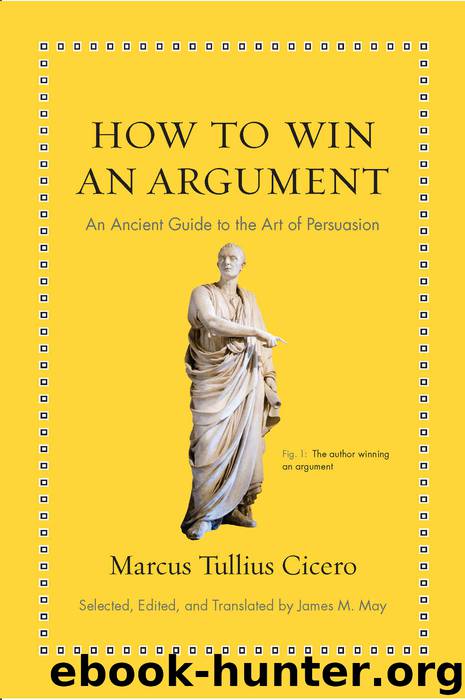How to Win an Argument: An Ancient Guide to the Art of Persuasion by Marcus Tullius Cicero

Author:Marcus Tullius Cicero [Cicero, Marcus Tullius]
Language: eng
Format: azw3
Publisher: Princeton University Press
Published: 2016-09-20T04:00:00+00:00
THE VALUE OF WRITING TO PREPARE FOR EFFECTIVE SPEAKING
The importance of learning to write clearly and cogently is well recognized in educational circles today. Increasing numbers, too, are acknowledging the importance of effective verbal communication as an important skill to be imparted to our students entering the world. The link between good speaking and good writing, while not readily apparent to some, was certainly clear to Cicero. As mentioned earlier (12–13), effective written composition entails the activities of invention, arrangement, and style—the first three of the five activities of the orator, and as such serves as a model exercise in training for effective speaking.
For my part, said Crassus, I approve of your habit of taking as a starting point some case very similar to those brought into the forum, and of speaking on it in a manner that is as true to life as possible. Most people, however, when doing this, merely exercise their voices (and not very knowledgeably at that), build their strength, quicken the speed of their tongues, and revel in the flood of their words. They have heard the saying that the way to become a speaker is to speak, and this misleads them. For there is another saying that is equally true: the easiest way to become a wretched speaker is to speak wretchedly. For this reason, although it is also useful, in these practice sessions of yours, to speak extemporaneously on a regular basis, it is still more useful to take some time for reflection, in order to speak better prepared and with greater care.
What is most fundamental, however, is something that, to be honest, we do least of all (for it involves a great deal of effort, which most of us try to avoid)—I mean writing as much as possible. It is the pen, the pen, that is the best and most eminent teacher and creator of speaking. And I am saying this with very good reason: if extemporaneous and random speech is easily surpassed by preparation and reflection, the latter, in turn, will certainly be outdone by constant and diligent writing. For as we investigate the matter and consider it with all of our powers of discernment, all commonplaces (at least as far as they are inherent in the subject on which we are writing), those provided by the art as well as those provided, in a way, by natural ability and intelligence, occur to us, revealing themselves to our minds. All the thoughts and all the words that are most appropriate to each type of subject, and that are most clear and brilliant, cannot help but pass under the point of our pen one after the other. In addition, writing perfects the ability of actually arranging and combining words, not in a poetic, but in a kind of oratorical measure and rhythm. These are the things that win a good orator shouts of approval and admiration, and no one will master them unless he has written long and written much—even if he has trained himself ever so vigorously in those extemporaneous speeches.
Download
This site does not store any files on its server. We only index and link to content provided by other sites. Please contact the content providers to delete copyright contents if any and email us, we'll remove relevant links or contents immediately.
| Anthropology | Archaeology |
| Philosophy | Politics & Government |
| Social Sciences | Sociology |
| Women's Studies |
The remains of the day by Kazuo Ishiguro(7551)
Tools of Titans by Timothy Ferriss(6946)
The Black Swan by Nassim Nicholas Taleb(6190)
Inner Engineering: A Yogi's Guide to Joy by Sadhguru(5895)
Giovanni's Room by James Baldwin(5878)
The Way of Zen by Alan W. Watts(5799)
The Six Wives Of Henry VIII (WOMEN IN HISTORY) by Fraser Antonia(4790)
The Power of Now: A Guide to Spiritual Enlightenment by Eckhart Tolle(4755)
Astrophysics for People in a Hurry by Neil DeGrasse Tyson(4620)
Asking the Right Questions: A Guide to Critical Thinking by M. Neil Browne & Stuart M. Keeley(4574)
12 Rules for Life by Jordan B. Peterson(3734)
The Ethical Slut by Janet W. Hardy(3502)
Skin in the Game by Nassim Nicholas Taleb(3460)
Housekeeping by Marilynne Robinson(3401)
The Art of Happiness by The Dalai Lama(3382)
Double Down (Diary of a Wimpy Kid Book 11) by Jeff Kinney(3272)
Skin in the Game: Hidden Asymmetries in Daily Life by Nassim Nicholas Taleb(3264)
Walking by Henry David Thoreau(3234)
12 Rules for Life: An Antidote to Chaos by Jordan B. Peterson(3200)
